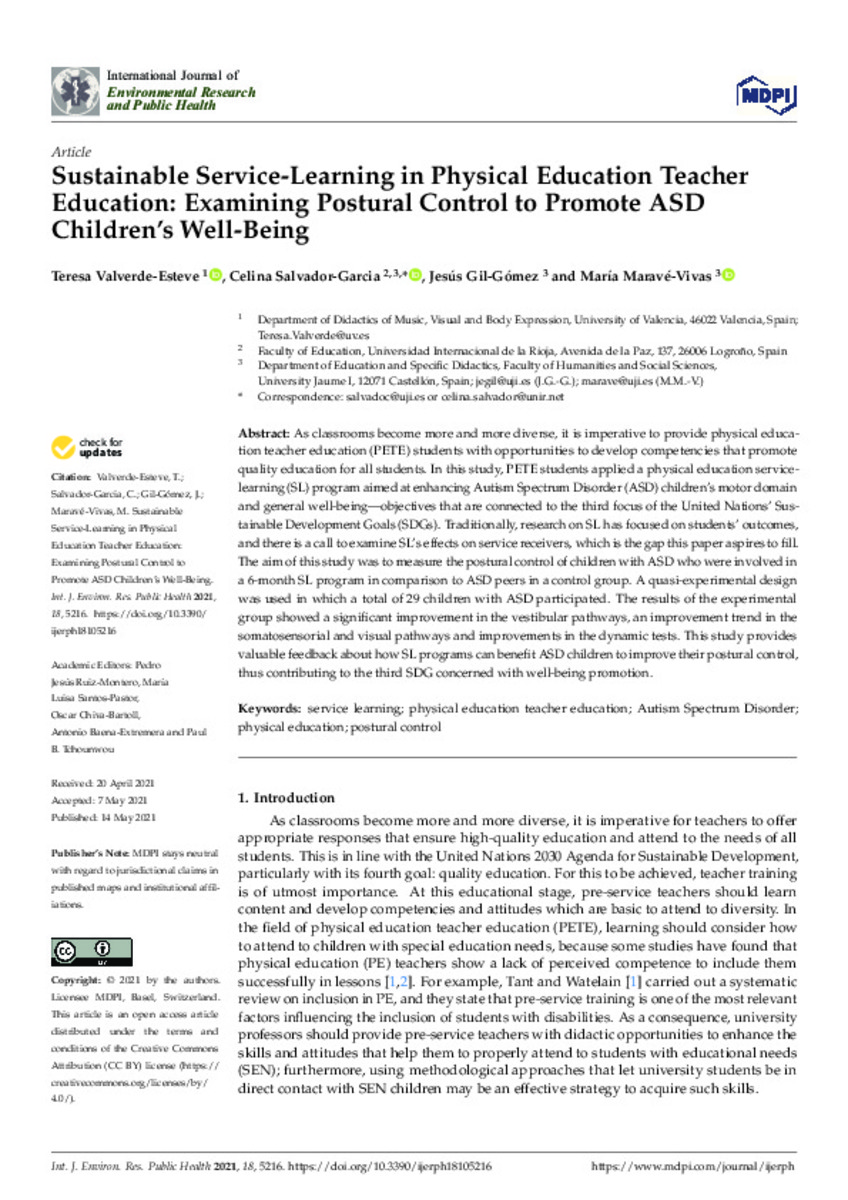Mostra el registre parcial de l'element
Sustainable service-learning in Physical Education teacher education: examining postural control to promote ASD children’s well-being
| dc.contributor.author | Valverde Esteve, Teresa | |
| dc.contributor.author | Salvador-Garcia, Celina | |
| dc.contributor.author | Gil-Gómez, Jesús | |
| dc.contributor.author | Maravé-Vivas, María | |
| dc.date.accessioned | 2021-06-09T13:00:13Z | |
| dc.date.available | 2021-06-09T13:00:13Z | |
| dc.date.issued | 2021-05-14 | |
| dc.identifier.citation | Valverde-Esteve, T.; Salvador-Garcia, C.; Gil-Gómez, J.; Maravé-Vivas, M. Sustainable Service-Learning in Physical Education Teacher Education: Examining Postural Control to Promote ASD Children’s Well-Being. Int. J. Environ. Res. Public Health 2021, 18, 5216. https://doi.org/10.3390/ ijerph18105216 | ca_CA |
| dc.identifier.issn | 1660-4601 | |
| dc.identifier.uri | http://hdl.handle.net/10234/193358 | |
| dc.description.abstract | As classrooms become more and more diverse, it is imperative to provide physical education teacher education (PETE) students with opportunities to develop competencies that promote quality education for all students. In this study, PETE students applied a physical education servicelearning (SL) program aimed at enhancing Autism Spectrum Disorder (ASD) children’s motor domain and general well-being—objectives that are connected to the third focus of the United Nations’ Sustainable Development Goals (SDGs). Traditionally, research on SL has focused on students’ outcomes, and there is a call to examine SL’s effects on service receivers, which is the gap this paper aspires to fill. The aim of this study was to measure the postural control of children with ASD who were involved in a 6-month SL program in comparison to ASD peers in a control group. A quasi-experimental design was used in which a total of 29 children with ASD participated. The results of the experimental group showed a significant improvement in the vestibular pathways, an improvement trend in the somatosensorial and visual pathways and improvements in the dynamic tests. This study provides valuable feedback about how SL programs can benefit ASD children to improve their postural control, thus contributing to the third SDG concerned with well-being promotion. | ca_CA |
| dc.format.extent | 13 p. | ca_CA |
| dc.format.mimetype | application/pdf | ca_CA |
| dc.language.iso | eng | ca_CA |
| dc.publisher | MDPI | ca_CA |
| dc.relation.isPartOf | International Journal of Environmental Research and Public Health. Vol. 18, Iss. 10, Núm. 5216 (May-2 2021) | ca_CA |
| dc.rights | © 2021 by the authors. Licensee MDPI, Basel, Switzerland. This article is an open access article distributed under the terms and conditions of the Creative Commons Attribution (CC BY) license (https:// creativecommons.org/licenses/by/ 4.0/). | ca_CA |
| dc.rights | Atribución 4.0 Internacional | * |
| dc.rights.uri | http://creativecommons.org/licenses/by-sa/4.0/ | * |
| dc.subject | service learning | ca_CA |
| dc.subject | physical education teacher education | ca_CA |
| dc.subject | Autism Spectrum Disorder | ca_CA |
| dc.subject | physical education | ca_CA |
| dc.subject | postural control | ca_CA |
| dc.title | Sustainable service-learning in Physical Education teacher education: examining postural control to promote ASD children’s well-being | ca_CA |
| dc.type | info:eu-repo/semantics/article | ca_CA |
| dc.identifier.doi | https://doi.org/10.3390/ijerph18105216 | |
| dc.rights.accessRights | info:eu-repo/semantics/openAccess | ca_CA |
| dc.type.version | info:eu-repo/semantics/publishedVersion | ca_CA |
| project.funder.name | Universitat Jaume I | ca_CA |
| project.funder.name | Universitat de València | ca_CA |
| project.funder.name | Generalitat Valenciana | ca_CA |
| oaire.awardNumber | UJI–A2019–01 | ca_CA |
| oaire.awardNumber | PREDOC/2016/53 | ca_CA |
| oaire.awardNumber | Best/2019/110 | ca_CA |
Fitxers en aquest element
Aquest element apareix en la col·lecció o col·leccions següent(s)
-
EDE_Articles [419]
Except where otherwise noted, this item's license is described as © 2021 by the authors.
Licensee MDPI, Basel, Switzerland.
This article is an open access article
distributed under the terms and
conditions of the Creative Commons
Attribution (CC BY) license (https://
creativecommons.org/licenses/by/
4.0/).








